Thanks for visiting the Art of the Image blog. We've moved over to www.artoftheimage.com so this blog is no longer updated, but please feel free to peruse the articles and content here.
When you're finished, please visit us at www.artoftheimage.com for all the current blog posts and information. Thanks!!!
When you're finished, please visit us at www.artoftheimage.com for all the current blog posts and information. Thanks!!!
Showing posts with label Nikon D700. Show all posts
Showing posts with label Nikon D700. Show all posts
Monday, March 14, 2011
Pick a Nikon DSLR Digital Camera for the Rest of Your Life - Nikon D7000 D700 D3s D3x D3100 D5000
Discussing Thom Hogan's "Camera For Life" question that was posed to him. A reader asked Thom if he had to choose a camera right now that would last him for the rest of his life, what would he choose. Bear in mind, Thom shoots Nikon DSLR digital cameras, so we're only talking Nikon here. He rules out 4/3 and compacts right away because of image quality, and then we're left with the current Nikon offering... the Nikon D3100, Nikon D5000, Nikon D7000, Nikon D700, Nikon D3s, and Nikon D3x. Here's what he chose...
Sunday, February 20, 2011
Signs of the Nikon D800 and D400 Coming: Nikon D700 Out of Stock, Nikon D300s Being Phased Out
The Nikon D700 is Out of Stock in Canada, and the Nikon D300s is Being Phased Out, two good signs that the Nikon D800 and Nikon D400 are right around the corner!
Click the play button above to get the full run-down on the Nikon D700, Nikon D300s, Nikon D800, and Nikon D400.
Thursday, February 3, 2011
Nikon D800: Thom Hogan Reveals Nikon D800 Specs and Announcement Date (Replaces Nikon D700)
Discussing Thom Hogan's Nikon D800 predictions on specs and release date for the much anticipated Nikon D700 replacement.
Thursday, November 4, 2010
Nikon D7000 vs Nikon D700 High ISO Shoot-Out
The burning question that's been on my mind since even before the new Nikon D7000 was announced, is how it would compare to my Nikon D700 for High ISO image quality and noise.
I've been shooting with the D7000 for five days now, and the image quality is VERY good. The Nikon D7000 has beautiful color rendition, and the new 16 megapixel sensor really delivers when it comes to detail.
Still, until one sees a side by side comparison, you can't really compare. So, I got out my Nikon D700, got out my Nikon D7000, stuck my Nikon 50mm f1.8D on the D700, stuck my Nikon 50mm f1.4G on the D7000, and prepared for a shoot-out!
I put together two different composite images from various stuff lying around the house and my office, and I also shot my Nikon 18-105mm by itself to add a very dark subject into the mix.
Both cameras had High ISO NR set to NORM, and both cameras were shot at identical shutter speed and aperture settings, with the exception of the photos of the Nikon 18-105mm which were metered identically in each camera and shot as such.
All images were processed in Lightroom 3.3 RC with no adjustments made and no additional noise reduction applied.
The results are very impressive. The Nikon D7000 performs VERY well against the Nikon D700. The D700 wins, but not by as much as you might think considering the D7000 is a crop sensor with 4 more megapixels.
The Nikon D700 resolves more detail the higher the ISO goes. It's at least a stop better than the D7000, probably getting close to two stops better at ISO 25,600.
Something interesting I noted... the D7000 seems to be automatically adjusting exposure at the higher ISO settings, despite being shot in manual. The D7000 images were all brighter than the D700 images at the same shutter speed and aperture, and it seemed to be more pronounced at the highest ISO settings. I imagine this is an automatic thing to try to minimize noise by keeping the photo from being under-exposed.
The Nikon D7000 also appears to be applying more aggresive noise reduction at the higher ISO settings compared to the D700. Specifically look at the detail in the tiger's nose fur at the higher ISO settings. You can see the D700 is doing better than the D7000. Again, I imagine this is Nikon's approach to maximizing image quality and minimizing noise.
Over-all, the Nikon D7000 fairs very well against the Nikon D700, especially up to ISO 6,400. At ISO 12,800 and 25,600, the D700 does noticably better than the D7000 at resolving detail with less noise. Again though, this speaks volumes to how well the D7000 sensor does when you consider it's a DX sensor with 4 more megapixels than the full fram D700 sensor.
For me, this means that the two are a perfect shooting combination. I'll likely use my D7000 where I want more resolution up to ISO 1600 or 3200, and my D700 when I'm in dimmer lighting and want to go SUPER high ISO at 12,800 or 25,600.
That said, if I didn't already own a D700, I'd have a tough time deciding whether to buy two Nikon D7000 bodies, or to go with a D700 / D7000 combination. I suspect I might just end up with two D7000's.
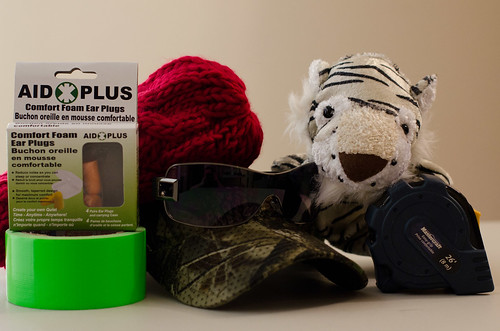
NIKON D7000 ISO 1600 1/100 f4
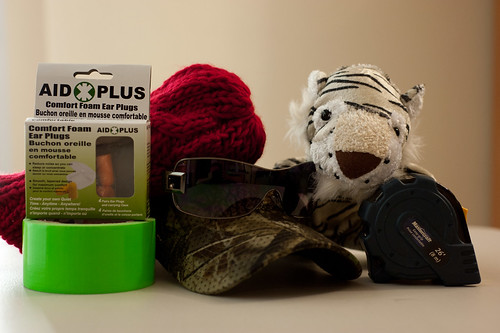
NIKON D700 ISO 1600 1/100 f4
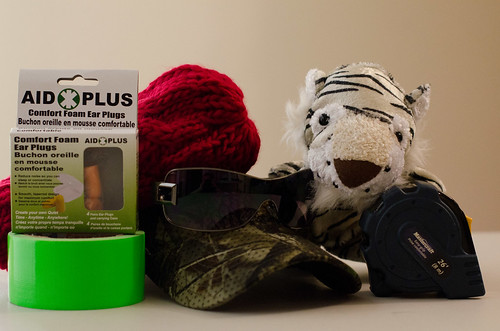
NIKON D7000 ISO 3200 1/200 f4
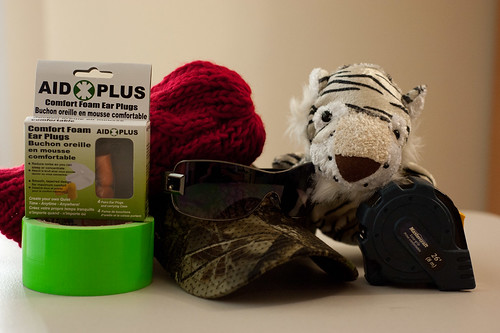
NIKON D700 ISO 3200 1/200 f4

NIKON D7000 ISO 6400 1/400 f4
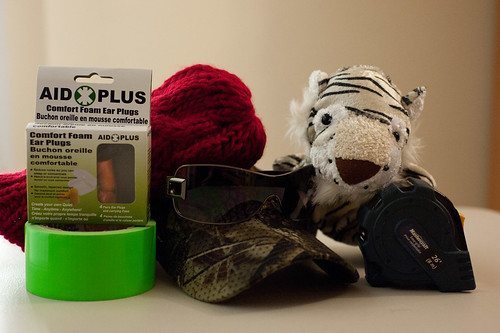
NIKON D700 ISO 6400 1/400 f4
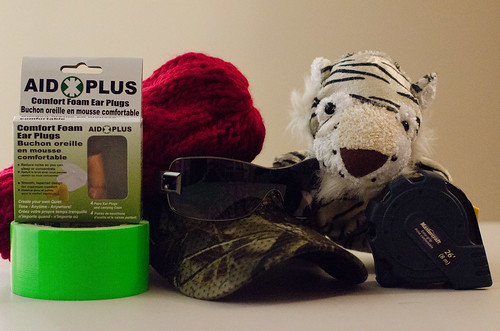
NIKON D7000 ISO 12,800 1/800 f4
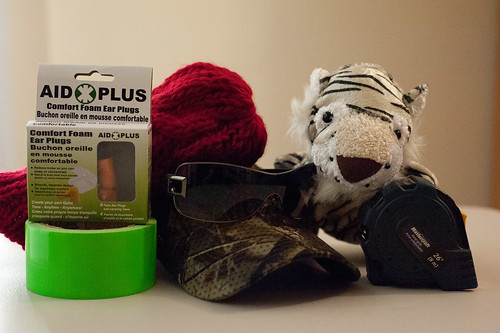
NIKON D700 ISO 12,800 1/800 f4
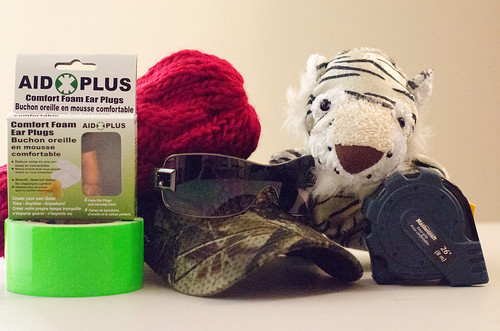
NIKON D7000 ISO 25,600 1/1600 f4
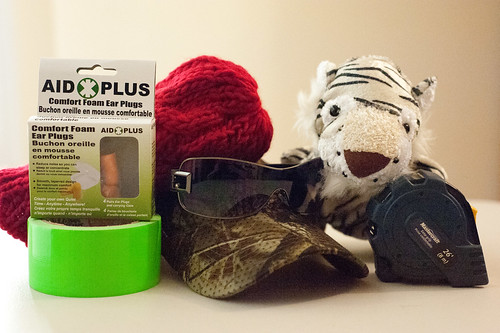
NIKON D700 ISO 25,600 1/1600 f4
The rest of the test shots are on the Nikon D7000 vs Nikon D700 High ISO Shoot-Out Flickr page. Feel free to download them and compare side by side!
Related posts...
Nikon D7000 One Month Review
Nikon D7000 vs Nikon D700 High ISO Shoot-Out
Nikon D7000 First Impressions After a Few Hours of Shooting
Nikon D7000 Unboxed Video
Nikon D7000 - The New Crop Sensor DSLR King!
Is the Nikon D7000 replacing the Nikon D300s / D400?
Nikon D7000 Spec Rundown
I've been shooting with the D7000 for five days now, and the image quality is VERY good. The Nikon D7000 has beautiful color rendition, and the new 16 megapixel sensor really delivers when it comes to detail.
Still, until one sees a side by side comparison, you can't really compare. So, I got out my Nikon D700, got out my Nikon D7000, stuck my Nikon 50mm f1.8D on the D700, stuck my Nikon 50mm f1.4G on the D7000, and prepared for a shoot-out!
I put together two different composite images from various stuff lying around the house and my office, and I also shot my Nikon 18-105mm by itself to add a very dark subject into the mix.
Both cameras had High ISO NR set to NORM, and both cameras were shot at identical shutter speed and aperture settings, with the exception of the photos of the Nikon 18-105mm which were metered identically in each camera and shot as such.
All images were processed in Lightroom 3.3 RC with no adjustments made and no additional noise reduction applied.
The results are very impressive. The Nikon D7000 performs VERY well against the Nikon D700. The D700 wins, but not by as much as you might think considering the D7000 is a crop sensor with 4 more megapixels.
The Nikon D700 resolves more detail the higher the ISO goes. It's at least a stop better than the D7000, probably getting close to two stops better at ISO 25,600.
Something interesting I noted... the D7000 seems to be automatically adjusting exposure at the higher ISO settings, despite being shot in manual. The D7000 images were all brighter than the D700 images at the same shutter speed and aperture, and it seemed to be more pronounced at the highest ISO settings. I imagine this is an automatic thing to try to minimize noise by keeping the photo from being under-exposed.
The Nikon D7000 also appears to be applying more aggresive noise reduction at the higher ISO settings compared to the D700. Specifically look at the detail in the tiger's nose fur at the higher ISO settings. You can see the D700 is doing better than the D7000. Again, I imagine this is Nikon's approach to maximizing image quality and minimizing noise.
Over-all, the Nikon D7000 fairs very well against the Nikon D700, especially up to ISO 6,400. At ISO 12,800 and 25,600, the D700 does noticably better than the D7000 at resolving detail with less noise. Again though, this speaks volumes to how well the D7000 sensor does when you consider it's a DX sensor with 4 more megapixels than the full fram D700 sensor.
For me, this means that the two are a perfect shooting combination. I'll likely use my D7000 where I want more resolution up to ISO 1600 or 3200, and my D700 when I'm in dimmer lighting and want to go SUPER high ISO at 12,800 or 25,600.
That said, if I didn't already own a D700, I'd have a tough time deciding whether to buy two Nikon D7000 bodies, or to go with a D700 / D7000 combination. I suspect I might just end up with two D7000's.

NIKON D7000 ISO 1600 1/100 f4

NIKON D700 ISO 1600 1/100 f4

NIKON D7000 ISO 3200 1/200 f4

NIKON D700 ISO 3200 1/200 f4

NIKON D7000 ISO 6400 1/400 f4

NIKON D700 ISO 6400 1/400 f4

NIKON D7000 ISO 12,800 1/800 f4

NIKON D700 ISO 12,800 1/800 f4

NIKON D7000 ISO 25,600 1/1600 f4

NIKON D700 ISO 25,600 1/1600 f4
The rest of the test shots are on the Nikon D7000 vs Nikon D700 High ISO Shoot-Out Flickr page. Feel free to download them and compare side by side!
Related posts...
Nikon D7000 One Month Review
Nikon D7000 vs Nikon D700 High ISO Shoot-Out
Nikon D7000 First Impressions After a Few Hours of Shooting
Nikon D7000 Unboxed Video
Nikon D7000 - The New Crop Sensor DSLR King!
Is the Nikon D7000 replacing the Nikon D300s / D400?
Nikon D7000 Spec Rundown
Thursday, August 27, 2009
Nikon D700X - Misconceptions On D700X Pricing
I've had a lot of comments and correspondence from readers who think the Nikon D700X needs to be priced to compete with the Canon 5D MkII.
The 5D MkII with its 21 megapixel sensor is close to the same size as the D3X's 24 megapixel sensor that the D700X will have, but that's where the comparisons end folks.
The Nikon D700X will be the same body as the D700, in other words, a full featured, nearly indestructable, beauty of a DSLR with an autofocus system rivaled by none. The 5D MkII just doesn't come close, other than having almost as many megapixels.
The 5D MkII doesn't have the same PRO level build quality. The 5D MkII doesn't have the fully rounded feature set. Most importantly, the 5D MkII has a dated focus system that is passable at best. Fact is, many 5D MkII users are having problems with the 5D MkII's autofocus.
The Nikon D700X isn't going to be priced at the 5D MkII level. It doesn't have to be. There is nothing else on the market to compete with it. When you build a better product, you set your own pricing. Do you think BMW cares how much Chrysler sells its vehicles for?
The perfect illustration of this is the Nikon D700. It's flying off the shelves everywhere. Loads of Canon shooters have switched to Nikon because of the D700's incredible autofocus, build quality, and high ISO abilities. The D700, like it's big brother the Nikon D3, is a class leading DSLR. They don't really have any true competition in the sense that no one is making a DSLR that equals what the D700 and D3 offer. The D700 is selling strong against the 5D MkII, and the D700 is priced higher. Why would anyone think the D700X will be priced at 5D MkII levels when the D700 isn't?
The Nikon D700 is currently $2995.95 at B&H. The 5D MkII is currently $2699.95. The D700 is $300.00 more, and it's not having any problems competing with the 5D MkII. Why one earth would Nikon bring out the D700X at a 5D MkII price point?
Uncle Bob Leaks TOP SECRET Info On The Nikon D700X
Nikon D700X Replacement For The D700?
The 5D MkII with its 21 megapixel sensor is close to the same size as the D3X's 24 megapixel sensor that the D700X will have, but that's where the comparisons end folks.
The Nikon D700X will be the same body as the D700, in other words, a full featured, nearly indestructable, beauty of a DSLR with an autofocus system rivaled by none. The 5D MkII just doesn't come close, other than having almost as many megapixels.
The 5D MkII doesn't have the same PRO level build quality. The 5D MkII doesn't have the fully rounded feature set. Most importantly, the 5D MkII has a dated focus system that is passable at best. Fact is, many 5D MkII users are having problems with the 5D MkII's autofocus.
The Nikon D700X isn't going to be priced at the 5D MkII level. It doesn't have to be. There is nothing else on the market to compete with it. When you build a better product, you set your own pricing. Do you think BMW cares how much Chrysler sells its vehicles for?
The perfect illustration of this is the Nikon D700. It's flying off the shelves everywhere. Loads of Canon shooters have switched to Nikon because of the D700's incredible autofocus, build quality, and high ISO abilities. The D700, like it's big brother the Nikon D3, is a class leading DSLR. They don't really have any true competition in the sense that no one is making a DSLR that equals what the D700 and D3 offer. The D700 is selling strong against the 5D MkII, and the D700 is priced higher. Why would anyone think the D700X will be priced at 5D MkII levels when the D700 isn't?
The Nikon D700 is currently $2995.95 at B&H. The 5D MkII is currently $2699.95. The D700 is $300.00 more, and it's not having any problems competing with the 5D MkII. Why one earth would Nikon bring out the D700X at a 5D MkII price point?
Uncle Bob Leaks TOP SECRET Info On The Nikon D700X
Nikon D700X Replacement For The D700?
Tuesday, August 25, 2009
Will The Canon 7D Be Able To Take On The Nikon D700X?

With all the talk of a Canon 7D coming soon, the obvious question is which Nikon DSLR will it be head to head against.
It's unlikely the 7D will be a competitor to the coming Nikon D700X as all indicators so far point to the 7D being either a 12 megapixel or 16 to 18 megapixel (my guess) DSLR. That puts the Canon 7D up against the Nikon D700, or in between the D700 and the D700X, depending on what how many megapixels the 7D sensor ends up being.
That'll be an interesting fight either way, as I don't expect the 7D to be of the same professional caliber build of the D700 and D700X. The Canon 7D will most likely be a 5D MkII / 50D type DSLR, neither of which is on par with the D700 or D700X.
So, the Canon 7D will be an interesting competitor. The 7D is expected to be under $2K, so that gives it a real price advantage over any full frame DSLR on the market, but one can't underestimate the alure of the build quality and feature sets on the D700 and D700X.
I suspect the Canon 7D will be a great seller for Canon regardless, but it likely won't be pulling any Nikon shooters off the Nikon team the way the D700 has been winning over Canon shooters. The 7D may help stop the exodus of Canon shooters to Nikon though, which will be especially fortuitous timing with the Nikon D700X rumored to be coming soon.
Like the Nikon D700 and coming D700X, the Canon 7D will have no real direct competition. Unless Nikon unveils a stripped down FX full frame DSLR before the end of the year, the 7D will enjoy an uncontested position in the DSLR market.
These are interesting times in the world of photography my friends!
**Update: Well, I was wrong and Canon is stupid. The Canon 7D has been announced, and there's no full frame, just an updated 50D. The 7D is DEFINITELY NO Competition for the D700X**
Related articles...
Re-Evaluating the Canon 7D
Canon EOS 7D - One Flickr Users Canon 7D PipeDream
Canon EOS 7D - Why Most Of The Canon 7D Specs Are Wrong
Canon EOS 7D - Will We Be Seeing a Canon 7D in September?
Uncle Bob Leaks TOP SECRET Info On The Nikon D700X
Nikon D700X Replacement For The D700?
Labels:
7D,
Canon 7D,
Canon EOS 7D,
D700,
D700x,
Nikon D700,
Nikon D700x
Sunday, June 28, 2009
Nikon D700x Replacement for the D700?
A lot of rumours are flying around about the Nikon D700x. Some are saying that sources at Nikon have told them it will be coming before the end of the year. Others are saying it will replace the D700. Most agree it will be 24 Megapixels like the Nikon D3X.
First of all, I don't think the D700x will replace the D700. The D700x will be a higher step in the Nikon DSLR product line, similar to the D700 and D3 relationship. If there is a replacement for the D700, it will likely be a D700s, and will be a minor update to the current model (think D2X and D2Xs).
As regular readers well know, I've been talking about this coming DSLR for some time now (see Stuff I Want, The Magic of the Nikon 35mm f2.0, How the Nikon D300 Froze My Bank Account), although I've been calling it the Nikon D800. By the way, my bet is still on the Nikon D800 as the name of this yet to be released dream camera. I just like D800 better. :)
Regardless of whether it's called the D700x or the D800, I think this camera is definitely on it's way. I'm not sure about it being out by the end of the year, but considering the release timing of the Nikon D3 and the Nikon D3X, I can see it happening. On top of that, an October or early November release would have it on shelves in time for Christmas, allowing Nikon to give their sales and financial numbers a BIG boost before year end.
Here's the specs I said I wanted for the D800 in my Stuff I Want post.
Nikon D800 - a 24 Mega-pixel version of the D700. No video. No flip down LCD. Just that SUPER SWEET sensor from the D3X in a D700 body at around $4K. I'll buy one for sure!
I'm still thinking the same specs for the Nikon D700x (or D800 if I'm right), although, I'm re-thinking the video. It's highly likely that Nikon will put video in the D700x as it seems to be the latest rage right now. While it's not something I'm really interested in, I'm not opposed to it as long as it doesn't come at the expense of something else (price?).
I'm also thinking the D700x will have Nikon's built in sensor cleaning feature, and possibly the flip down LCD. I know I said no flip down LCD previously, but it makes sense that Nikon would want to make this camera as feature rich as possible. Nikon has a proud tradition of packing their DSLR's full of features, in direct contrast to Canon, who traditionally give their DSLR's (other than the flagships) a stripped down feature set.
Of course Nikon may not want to put ALL the latest features in the D700x for fear of hurting the D3X sales. I personally don't think this will be the case (just look at the D700 and D3 for a perfect example), but it's a valid point to consider.
In any case, heres my up-dated specs for the D700x (D800).
- 24 Megapixel Sensor (same one as the D3X)
- same body as the D700 / D300
- same feature set as the D700 but also adds...
- built in image sensor cleaning
- flip down LCD
- HD video movie mode
- microphone input jack for the HD video movie mode
- Live View Auto Focus in real time
Hopefully it won't be much longer now before we see how close I was on the specs. :)
****Update: Uncle Bob Leaks TOP SECRET Info On The Nikon D700X ****
****Update: Nikon D700X vs the Nikon D3X ****
First of all, I don't think the D700x will replace the D700. The D700x will be a higher step in the Nikon DSLR product line, similar to the D700 and D3 relationship. If there is a replacement for the D700, it will likely be a D700s, and will be a minor update to the current model (think D2X and D2Xs).
As regular readers well know, I've been talking about this coming DSLR for some time now (see Stuff I Want, The Magic of the Nikon 35mm f2.0, How the Nikon D300 Froze My Bank Account), although I've been calling it the Nikon D800. By the way, my bet is still on the Nikon D800 as the name of this yet to be released dream camera. I just like D800 better. :)
Regardless of whether it's called the D700x or the D800, I think this camera is definitely on it's way. I'm not sure about it being out by the end of the year, but considering the release timing of the Nikon D3 and the Nikon D3X, I can see it happening. On top of that, an October or early November release would have it on shelves in time for Christmas, allowing Nikon to give their sales and financial numbers a BIG boost before year end.
Here's the specs I said I wanted for the D800 in my Stuff I Want post.
Nikon D800 - a 24 Mega-pixel version of the D700. No video. No flip down LCD. Just that SUPER SWEET sensor from the D3X in a D700 body at around $4K. I'll buy one for sure!
I'm still thinking the same specs for the Nikon D700x (or D800 if I'm right), although, I'm re-thinking the video. It's highly likely that Nikon will put video in the D700x as it seems to be the latest rage right now. While it's not something I'm really interested in, I'm not opposed to it as long as it doesn't come at the expense of something else (price?).
I'm also thinking the D700x will have Nikon's built in sensor cleaning feature, and possibly the flip down LCD. I know I said no flip down LCD previously, but it makes sense that Nikon would want to make this camera as feature rich as possible. Nikon has a proud tradition of packing their DSLR's full of features, in direct contrast to Canon, who traditionally give their DSLR's (other than the flagships) a stripped down feature set.
Of course Nikon may not want to put ALL the latest features in the D700x for fear of hurting the D3X sales. I personally don't think this will be the case (just look at the D700 and D3 for a perfect example), but it's a valid point to consider.
In any case, heres my up-dated specs for the D700x (D800).
- 24 Megapixel Sensor (same one as the D3X)
- same body as the D700 / D300
- same feature set as the D700 but also adds...
- built in image sensor cleaning
- flip down LCD
- HD video movie mode
- microphone input jack for the HD video movie mode
- Live View Auto Focus in real time
Hopefully it won't be much longer now before we see how close I was on the specs. :)
****Update: Uncle Bob Leaks TOP SECRET Info On The Nikon D700X ****
****Update: Nikon D700X vs the Nikon D3X ****
Labels:
D700x specs,
D800 specs,
Nikon D700,
Nikon D700x,
Nikon D800
Saturday, May 9, 2009
How the Nikon D300 Froze My Bank Account
I was shooting with a pair of 40D Canon DSLR's before the D300 came out. Prior to that, it was a 5D and 30D combo. Prior to that it was a pair of 20D Canons, and before that it was a Nikon D200 and D70 combo.

It was the D300 that brought me back home to Nikon.
The D300 was a revolution in many ways. The D300 offered everything that the previous Nikon flagship (the popular D2Xs) had, and more. Even more amazing, the D300 had Nikon's new industry leading Auto-Focus system, the same one found in the D3! How could this be? No camera maker had ever before put their top of the line AF system into a DSLR at this price point!
The D300 had a rugged, professional build, metal body. The D300 came loaded with a brand new 12 Megapixel sensor that was much cleaner at high ISO than any previous Nikon DSLR (except, obviously, the D3 which was itself a new camera introduced at about the same time as the D300). The D300 offered more features than ever before, and it offered all of this at the un-heard of price of $2,000 Canadian! The camera world was shaken! A camera that did everything better than the D2Xs, at a third of the price!
My D300's have frozen my camera equipment expenditures. Amazingly, I haven't bought a new DSLR in almost 2 years. Even more amazing, I have no plans to purchase one any time soon. The D300 did for me what the F100 did for so many people back when we shot film. It met all my requirements, and then some, leaving me no burning desire to buy any of the latest and greatest that have come since. Granted, the D300 is still fairly new and has most, if not all, of the current Nikon technology, so it's not like I'm missing anything.
What is new for me is the contentment. Previously, I've always been eager to try out the newest DSLR's that are released to see what they can do (and I have). Now, not so much. My D300's perform wonderfully and meet all my photographic needs. The 12 Megapixel sensor inside the D300 is fantastic, and certainly more than enough MP's for all but the most demanding of jobs. Even the incredible D3 and D700 are 12 megapixel, although granted an entirely different 12 megapixels.
The big difference between the Nikon D3 and Nikon D700 sensor versus the D300 sensor is the high ISO performance. The D300 has very good high ISO performance, but the D3 and D700 take high ISO performance to a whole new level. NOTHING can touch them for high ISO performance. Shooting at ISO 6400 is perfectly acceptable with the D3 and D700, whereas, I like to stay at 1600 ISO and below with the D300. Sometimes I'll kick it up to 3200 in a pinch, especially if I know the image is going to be black & white, but basically I stay at 1600 and below when I'm shooting my D300's.

Obviously the other big difference between the D3 / D700 and the D300 is the sensor size. The D3 and D700 are full frame FX chips, while the D300 is a crop sensor DX chip. Full frame isn't such a big deal to me, but for some it is nothing short of the Holy Grail. The big appeal of the D3 and D700 for me is the high ISO performance. They can practically see in the dark. I must admit, I do like the idea of having that SUPER clean high ISO option available... I just don't like the price. :)
While the high ISO performance of the D3 and D700 is appealing, it's not enough for me to justify the added price. The D300 has the same body and auto focus system as the D700, and the same number of Megapixels. The D300 has excellent high ISO performance, just not the Super Human high ISO performance of the D700. As such, for me at this time, there's just not enough there to justify the added expense of the D700 over the D300. The D3 isn't even a consideration for me as I prefer the lighter, smaller D300 / D700 body style to the larger, heavier D3 / D3X body style.
In a nutshell, the only real difference between the D700 and D300 that is a consideration for me is the high ISO performance. The full frame versus cropped sensor isn't really a factor for me as I like both, although I know for many shooters full frame alone is worth the switch to the D700 (or D3 or D3X). I'm used to DX, and I like shooting with DX cameras. That said, I also like FX, and I know I will acclimatize to full frame very quickly when the time comes.
So I'm left in a very comfortable, very foreign position. I'm VERY happy with my D300 Nikon bodies and have no plans to replace them in the near future. I've decided to pass on the D700 for now. In a year or two when the next round of Nikon DSLR's come out, they'll likely offer a whole host of exciting new features, and I'll probably buy one of the new offerings. In all likelihood, the D3X chip will be available in a D700 type body by then (probably a D800, but who knows for sure), and the price will likely be equal to, or lower, than the current D700 pricing. THAT will be a camera I will be SERIOUSLY interested in. Perhaps it will even have the high ISO performance of the D3 and D700, but with the stunning 24 Megapixels of the D3X!

It was the D300 that brought me back home to Nikon.
The D300 was a revolution in many ways. The D300 offered everything that the previous Nikon flagship (the popular D2Xs) had, and more. Even more amazing, the D300 had Nikon's new industry leading Auto-Focus system, the same one found in the D3! How could this be? No camera maker had ever before put their top of the line AF system into a DSLR at this price point!
The D300 had a rugged, professional build, metal body. The D300 came loaded with a brand new 12 Megapixel sensor that was much cleaner at high ISO than any previous Nikon DSLR (except, obviously, the D3 which was itself a new camera introduced at about the same time as the D300). The D300 offered more features than ever before, and it offered all of this at the un-heard of price of $2,000 Canadian! The camera world was shaken! A camera that did everything better than the D2Xs, at a third of the price!
My D300's have frozen my camera equipment expenditures. Amazingly, I haven't bought a new DSLR in almost 2 years. Even more amazing, I have no plans to purchase one any time soon. The D300 did for me what the F100 did for so many people back when we shot film. It met all my requirements, and then some, leaving me no burning desire to buy any of the latest and greatest that have come since. Granted, the D300 is still fairly new and has most, if not all, of the current Nikon technology, so it's not like I'm missing anything.
What is new for me is the contentment. Previously, I've always been eager to try out the newest DSLR's that are released to see what they can do (and I have). Now, not so much. My D300's perform wonderfully and meet all my photographic needs. The 12 Megapixel sensor inside the D300 is fantastic, and certainly more than enough MP's for all but the most demanding of jobs. Even the incredible D3 and D700 are 12 megapixel, although granted an entirely different 12 megapixels.
The big difference between the Nikon D3 and Nikon D700 sensor versus the D300 sensor is the high ISO performance. The D300 has very good high ISO performance, but the D3 and D700 take high ISO performance to a whole new level. NOTHING can touch them for high ISO performance. Shooting at ISO 6400 is perfectly acceptable with the D3 and D700, whereas, I like to stay at 1600 ISO and below with the D300. Sometimes I'll kick it up to 3200 in a pinch, especially if I know the image is going to be black & white, but basically I stay at 1600 and below when I'm shooting my D300's.

Obviously the other big difference between the D3 / D700 and the D300 is the sensor size. The D3 and D700 are full frame FX chips, while the D300 is a crop sensor DX chip. Full frame isn't such a big deal to me, but for some it is nothing short of the Holy Grail. The big appeal of the D3 and D700 for me is the high ISO performance. They can practically see in the dark. I must admit, I do like the idea of having that SUPER clean high ISO option available... I just don't like the price. :)
While the high ISO performance of the D3 and D700 is appealing, it's not enough for me to justify the added price. The D300 has the same body and auto focus system as the D700, and the same number of Megapixels. The D300 has excellent high ISO performance, just not the Super Human high ISO performance of the D700. As such, for me at this time, there's just not enough there to justify the added expense of the D700 over the D300. The D3 isn't even a consideration for me as I prefer the lighter, smaller D300 / D700 body style to the larger, heavier D3 / D3X body style.
In a nutshell, the only real difference between the D700 and D300 that is a consideration for me is the high ISO performance. The full frame versus cropped sensor isn't really a factor for me as I like both, although I know for many shooters full frame alone is worth the switch to the D700 (or D3 or D3X). I'm used to DX, and I like shooting with DX cameras. That said, I also like FX, and I know I will acclimatize to full frame very quickly when the time comes.
So I'm left in a very comfortable, very foreign position. I'm VERY happy with my D300 Nikon bodies and have no plans to replace them in the near future. I've decided to pass on the D700 for now. In a year or two when the next round of Nikon DSLR's come out, they'll likely offer a whole host of exciting new features, and I'll probably buy one of the new offerings. In all likelihood, the D3X chip will be available in a D700 type body by then (probably a D800, but who knows for sure), and the price will likely be equal to, or lower, than the current D700 pricing. THAT will be a camera I will be SERIOUSLY interested in. Perhaps it will even have the high ISO performance of the D3 and D700, but with the stunning 24 Megapixels of the D3X!
Labels:
Nikon D300,
Nikon D700,
Nikon D800
Wednesday, April 29, 2009
Canon to Nikon: How I Learned To Stop Worrying And Love The Switch

My friend Brian Tao, a great photographer who's also one of the smartest tech guys I know, just switched to Nikon after years of shooting only Canon. He's graciously agreed to let me post the article he wrote about the switch, so enjoy!

That's Mihkel Fortey trying to help me decide between the 5D Mark II and the D700. I've been a Canon shooter almost all of my professional life, but for the first time, I felt Nikon might have a product that better suits me. I currently shoot with a pair of 40D's, so the first question was whether I needed to upgrade at all. If "yes", the second question was whether I stuck with Canon or switched to Nikon.
I've meditated upon this decision for many months now, aware of the costs of switching, aware of the "grass is greener" syndrome, aware that I had to balance my personal lust for new toys with the responsibility of running a business, and always remembering that none of my past clients ever expressed any concern over the type of equipment I used.
This will turn out to be a very long post, but I'm not going to type it all out at once, since I will undoubtedly forget to cover a point or miss a detail somewhere. So I'll just start with why I felt a decision had to be made, and the major influences of that decision.
It used to be that digital cameras suffered from poor battery life, slow response times, insufficient pixel resolution, a small shot buffer, unnatural colour, etc. One by one, the technical limitations fell away. Now, only two major ones remain for me: AF performance and ISO noise. I can never have too much of the former, nor too little of the latter. Problems with battery life, pixel count, colour rendition, and so on have all been more than adequately solved for my needs.
For the most part, I have been happy with the AF performance of my 40D. I used the center point 90% of the time, and kept a 580EX II in the hotshoe to help out in low light situations. Paired with the right lenses (notably my 135 f/2L and 17-55 f/2.8 IS), I was able to get good, sharp photos. It wasn't 100%, but close enough that no important shots were ever missed.
ISO noise was also quite respectable. I would often shoot at 1600 and, properly exposed, would get some great images. I like the noise characteristics of the 40D, with no visible banding or pattern noise until I'm reaching up to ISO 3200 pushed 1 or 2 stops.
But as I said, I can always use better AF and less noise.
The obvious successors to my 40D were the 5D Mark II and the D700. The 5D2 was the comfortable choice. Buy two new bodies, and away I go. Same lenses (mostly), same speedlites, same controls, same ergonomics. Yet at the same time, the reasons why I went with Canon over Nikon 7 years ago no longer held true. Nikon had caught up (if not surpassed) Canon on several fronts. I had always recognized the strong points of the Nikon system, but I think the introduction of the D3 (and then D700) was a watershed moment that allowed Nikon to finally take the final crown: image quality.
I'll skip the details for now, but I studied everything from the cameras themselves, to the lens lineups of both companies, to their product roadmap and their marketing strategies. I had plenty of hands-on evaluation with both cameras (thanks to many DWF'ers who lent me their gear). In the end, I had to give the D700 the edge over the 5D2, but perhaps not for the reasons most people would expect.
Image quality and AF performance were remarkably even. The Canon was better in some areas, while the Nikon excelled in others. It would have been a very difficult decision had I only considered those points.
In the end, I decided that switching to Nikon would be the best long-term move for two entirely different reasons: confidence in one's equipment, and the company's product development philosophy. I won't rehash everything here, but read Brett's thread about what happens when you can't trust your gear:
[private DWF link omitted] - {http://www.digitalweddingforum.com}
But what do I mean by "product development philosophy"? Both Canon and Nikon produce gear that is used daily by tens or hundreds of thousands of professionals. There is no arguing they know the business, and they know what it takes to succeed as an equipment manufacturer. But as an outsider, I suspect that these two companies go about things very differently.
I have long noticed that Nikon seems to introduce more useful features and functions that go unanswered by Canon, rather than the other way around. I'm not talking about video capability, Live View, AF microadjustment, high-res LCD screens, etc. Those are the headliner features, and both companies have developed them to stay competitive. No, I'm talking about the smaller, sometimes unnoticed things.
I'll expound more on this later, but the basic gist is this: there are more settings and configurable options on the D700 than on any Canon I've used, 1 series included. And for settings that are on both cameras, Nikon tends to allow more flexibility in the settings. I may not need all those settings, and I may not even understand the utility of some settings... but I appreciate that Nikon gives me more ways to customize the camera's operation than Canon.
The second part of the philosophy question has to do with their product lineup. Canon is very good at maintaining clear, distinct lines between their various camera models. They save the best features for the 1 series cameras, and remove features as you move down to the 5's, 10's and Rebel series. Canon does not believe in putting "pro" features in a "non-pro" camera... I mean, if they made the 50D too good, nobody would have a reason to go with a 1D Mark III, right?
Nikon seems to be less concerned about product differentiation. Are they crazy for putting the D3's sensor and AF module in the D700, then selling it for $1500 less? I know when I looked at both, I really couldn't see much justification to pony up for the D3. The D700 already has most of the important parts!
I think this is due in part to Nikon not "dumbing down" their cameras to fit a product line, the way Canon does. Example: why is the 40D limited to +/- 2 stops of bracketing in 3 shots? The 1 series can do +/- 3 stops with 2, 3, 5 or 7 shots. The D700 can do +/- 5 stops with 2 to 9 shots. The difference is only in software. Example: the D700 has a built-in intervalometer. None of Canon's DSLRs have that feature... oh, but their cheap point-and-shoots do! Again, that is a software feature... the hardware is perfectly capable of doing it.
And then you get into the more significant capabilities. Wireless commander mode on the Nikons is a perfect example. The built-in pop-up flash on the D700 can control multiple off-camera speedlites. That is an amazing feature! Now I can travel with one body and one flash, and still have the option of doing some quick off-camera lighting. With the Canon, I either have to pack two speedlites, or a speedlite and an ST-E2. That then requires a bag or pouch of some sort, instead of just hanging the camera around my neck and nothing else.
So in the end, I feel that Nikon's philosophy results in a better feature set at a lower price point than Canon. I can understand Canon's desire for product differentiation, but as a consumer I appreciate Nikon's approach more. With Canon, I feel they are deliberately crippling their cameras to "encourage" people to buyer a higher-end model than they otherwise need. Canon says "we would rather you buy a 1D Mark III instead of a 50D". Nikon says "it doesn't matter whether you buy a D700 or D3, we still get your dollars".
Earlier today, I called my local camera dealer and put in an order for a D700, 24-70/2.8, MB-D10 grip, a couple extra EN-EL3a's, and an SB-900. I'll start with that, and then decide how to outfit a second D700 later. I will be picking up everything except the lens tomorrow.
Brian also runs a RAW image file processing company called Raw Pudding. If you're tired of doing your own RAW processing and are looking for another option, check it out! Prices are reasonable and quality is excellent. Brian will basically analyze your "look" and "style" and process your files to look like you did them. How cool is that!
Subscribe to:
Comments (Atom)